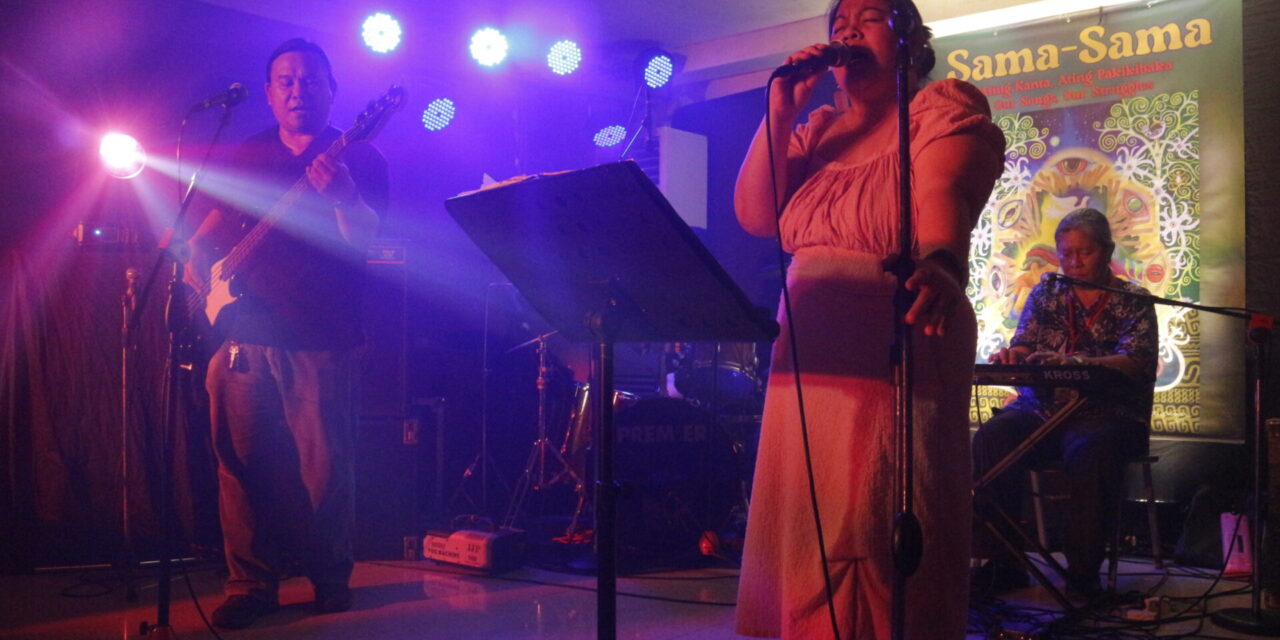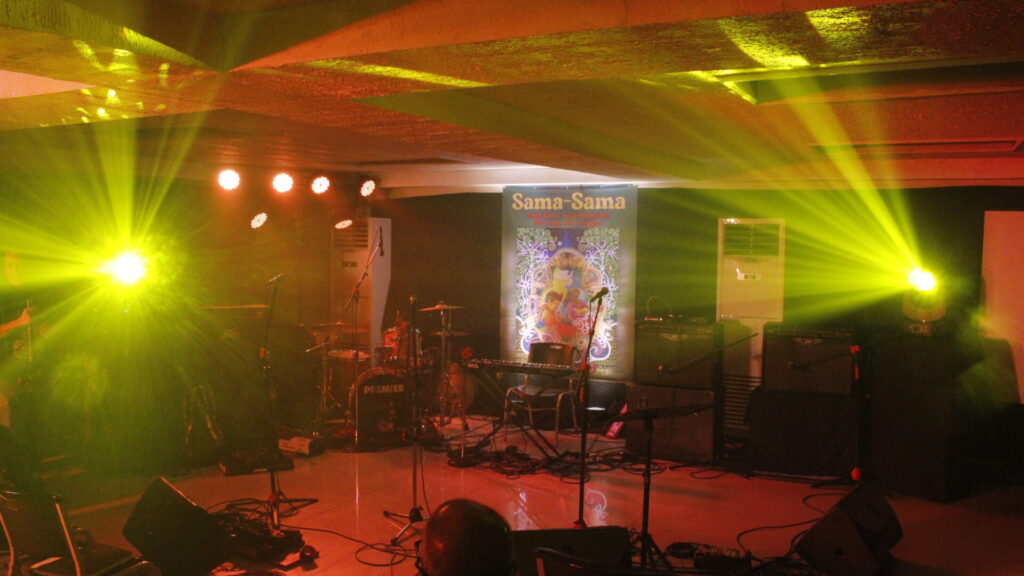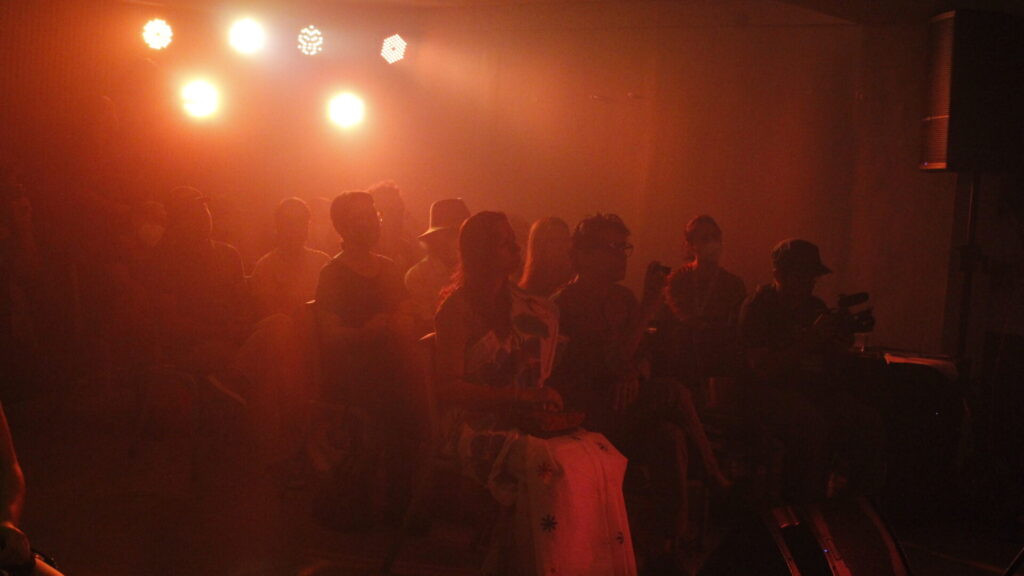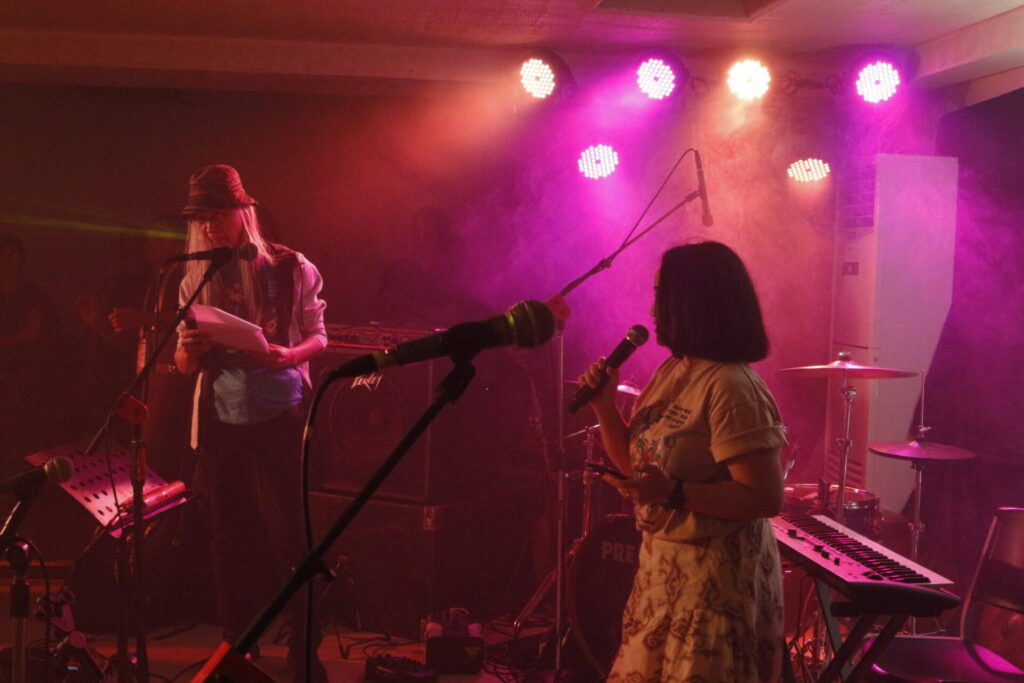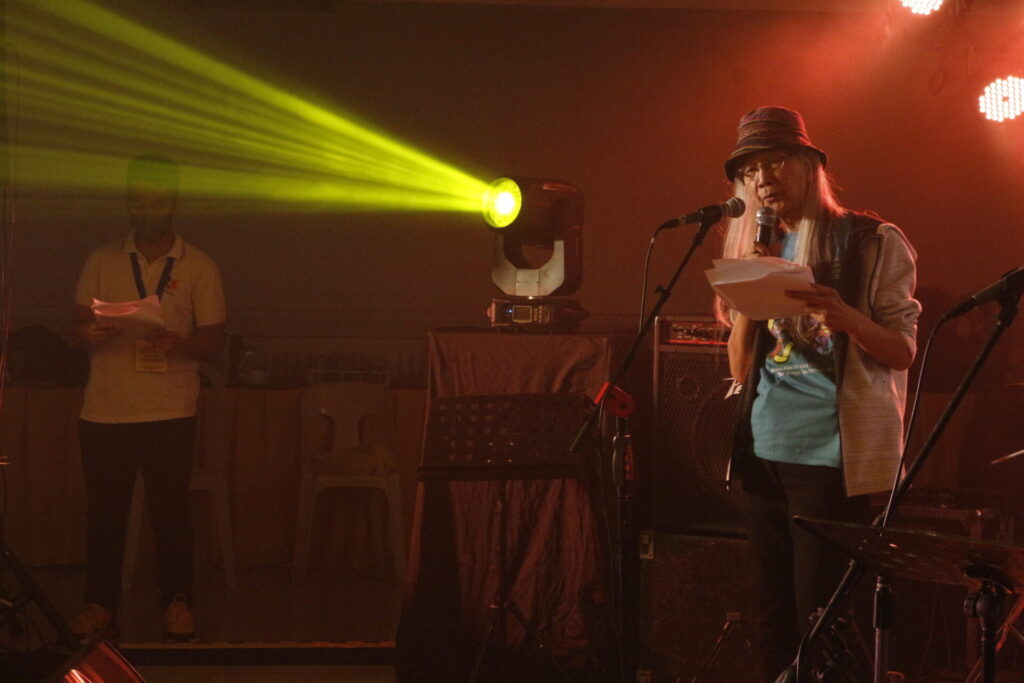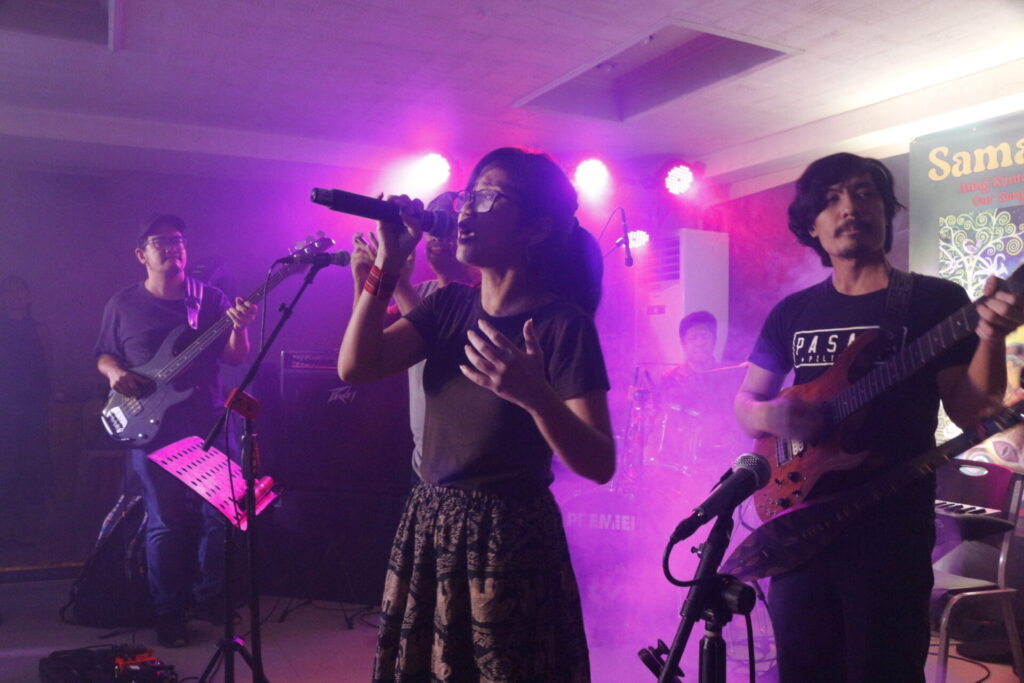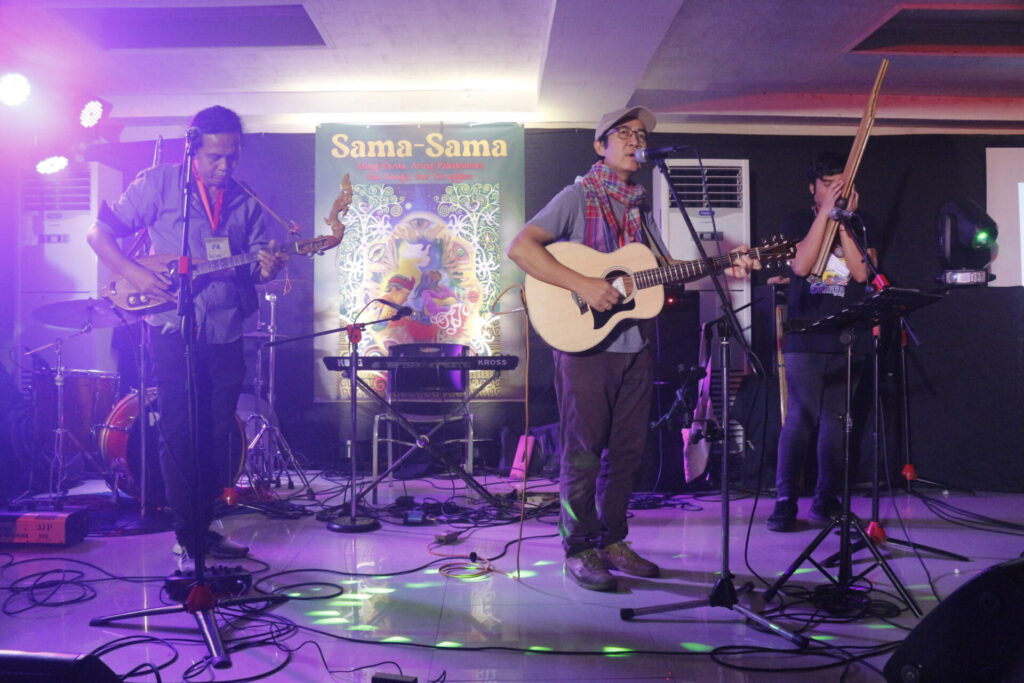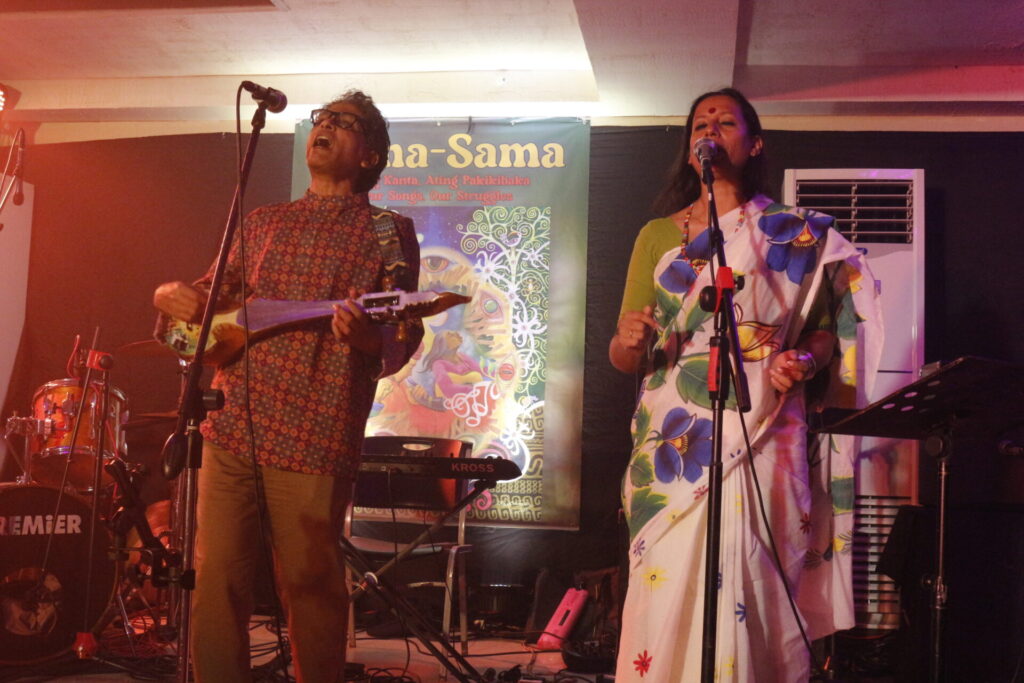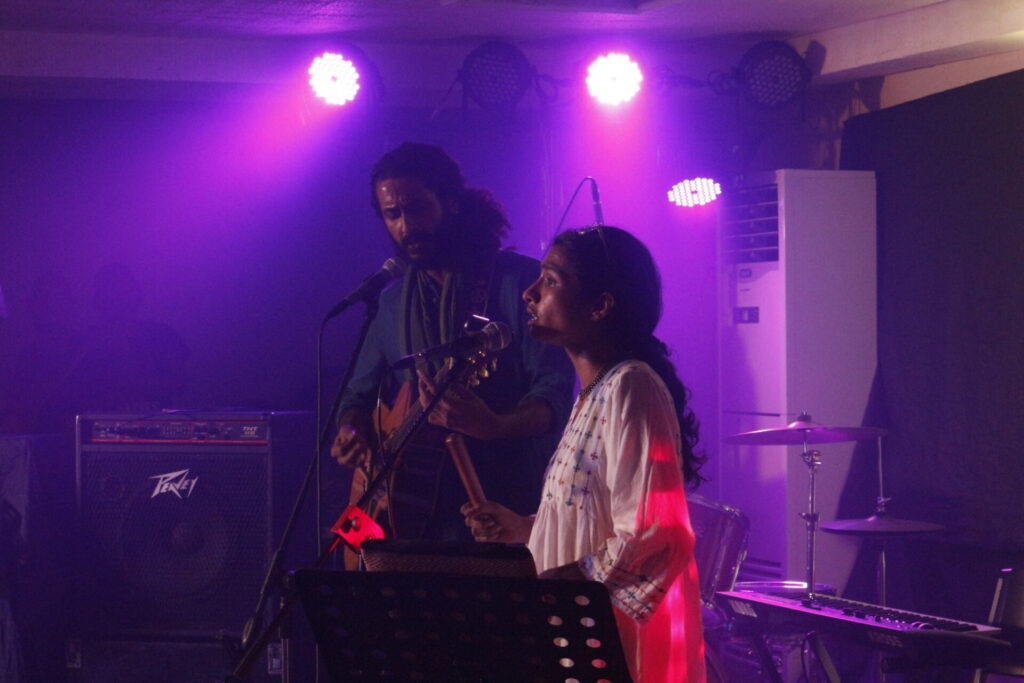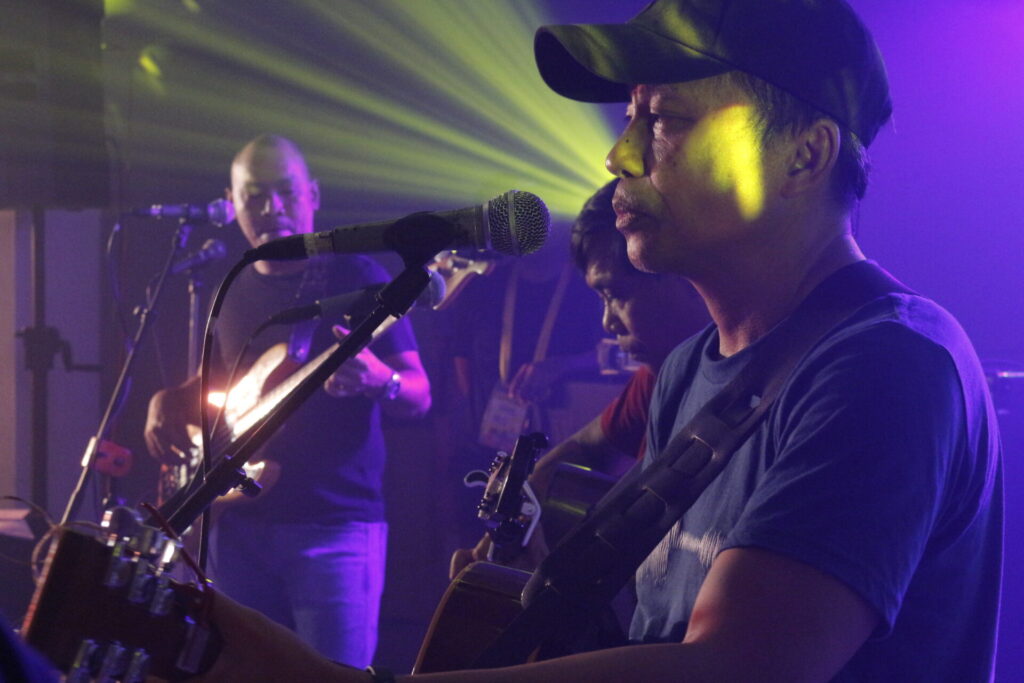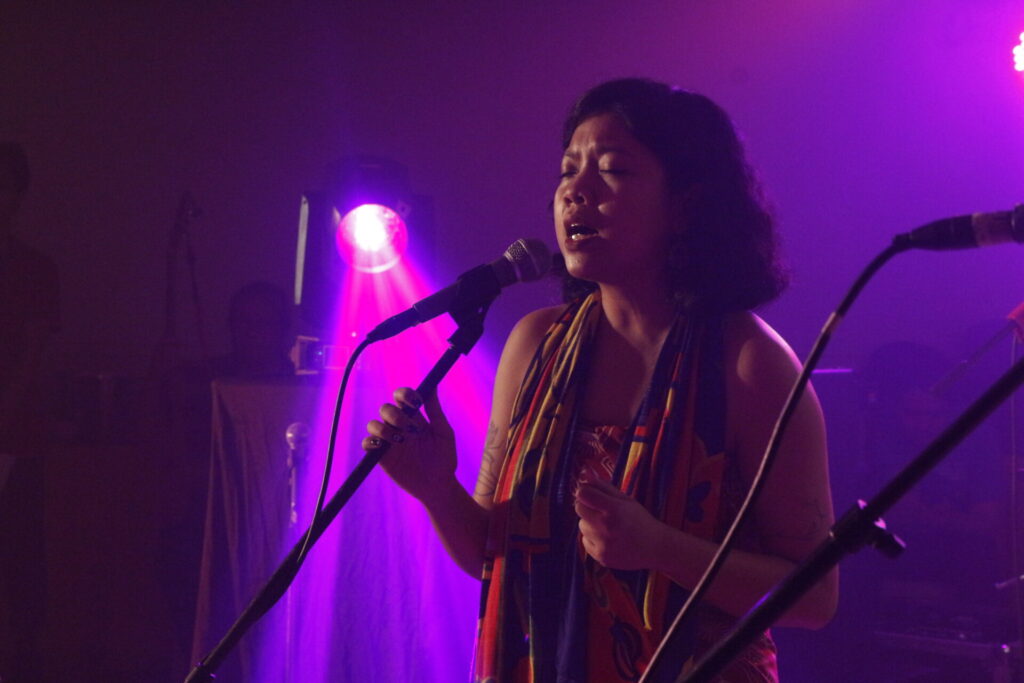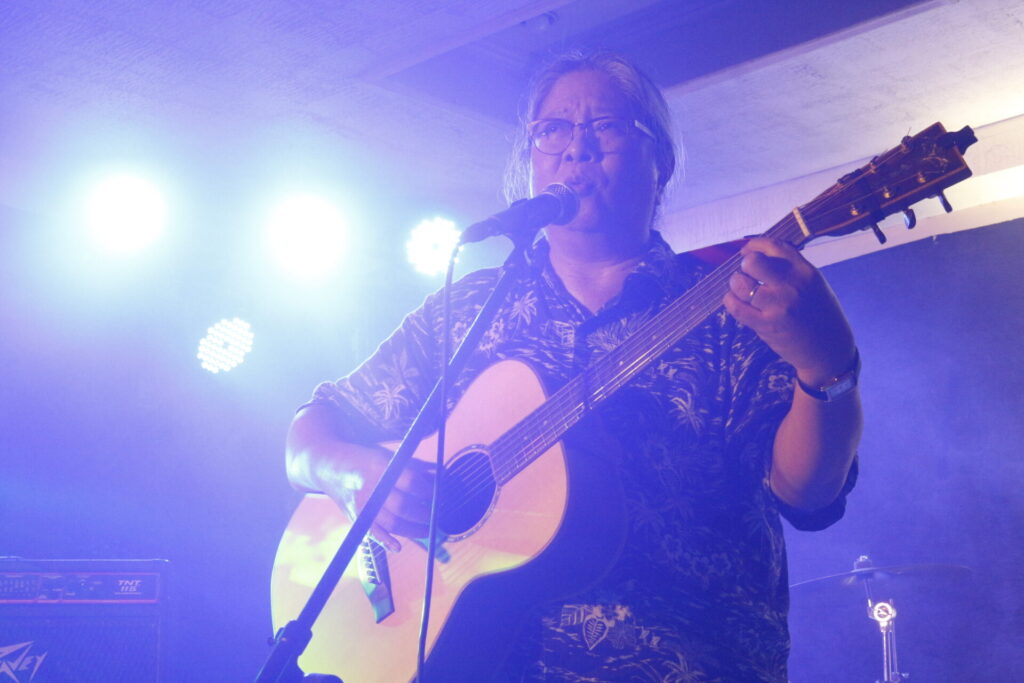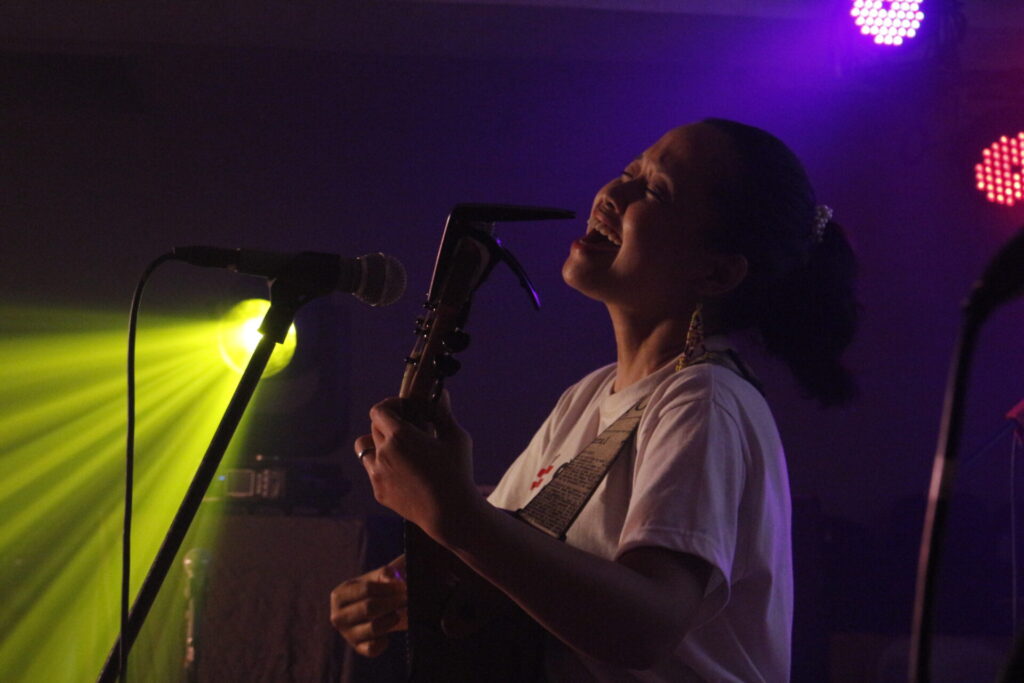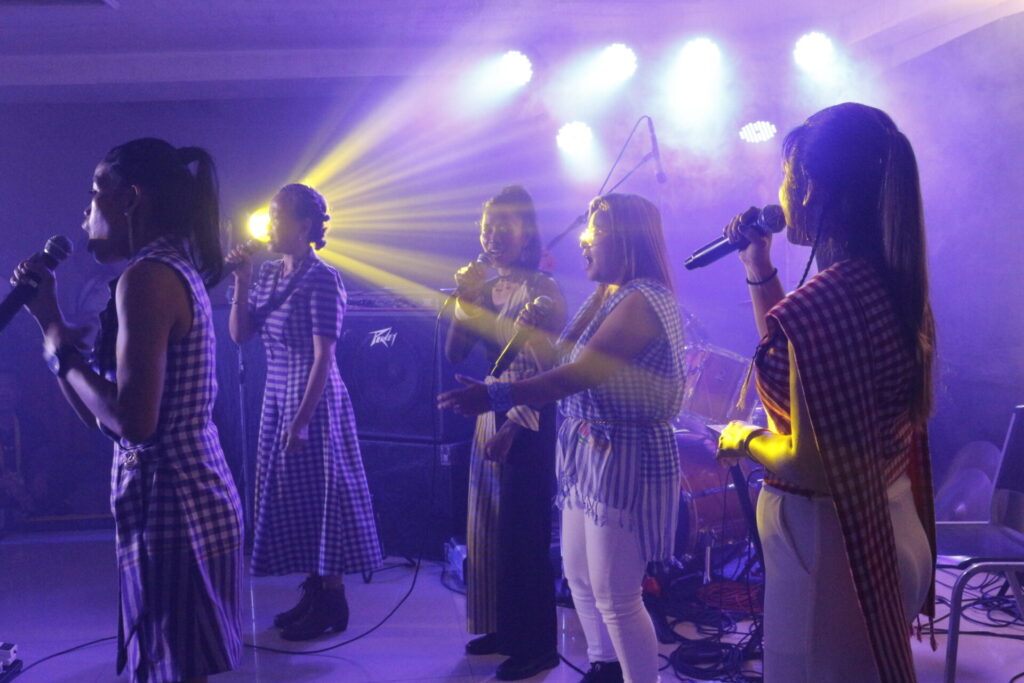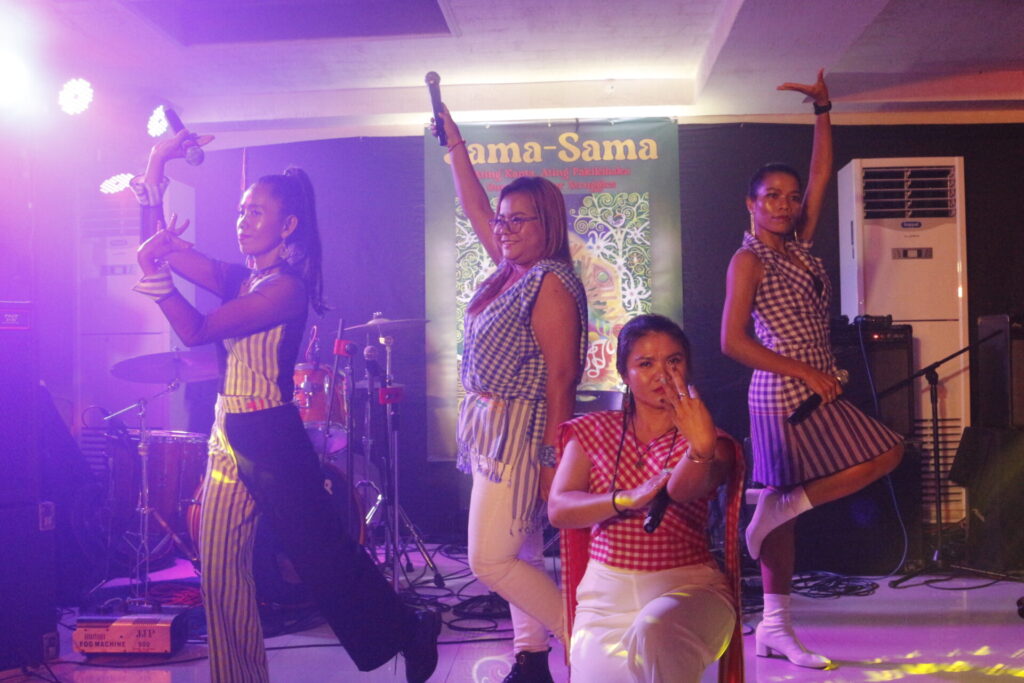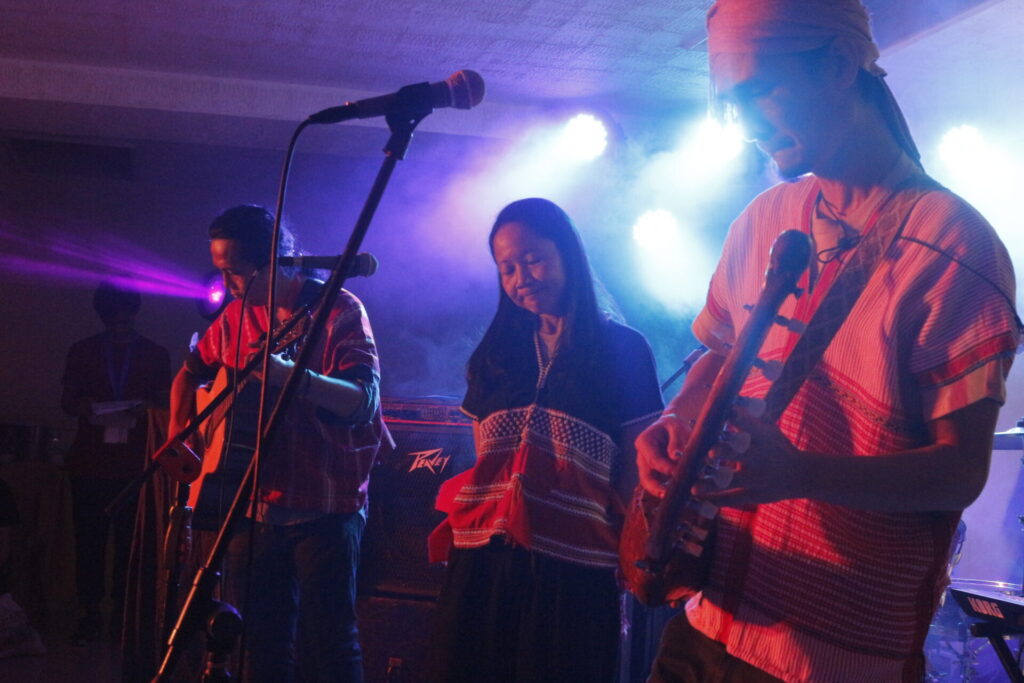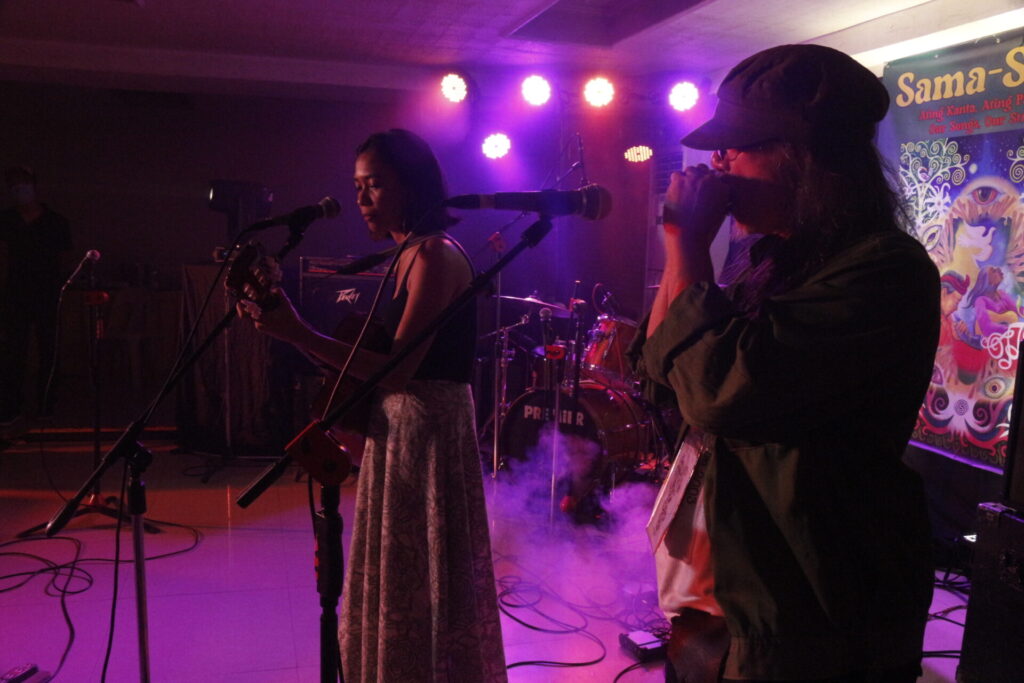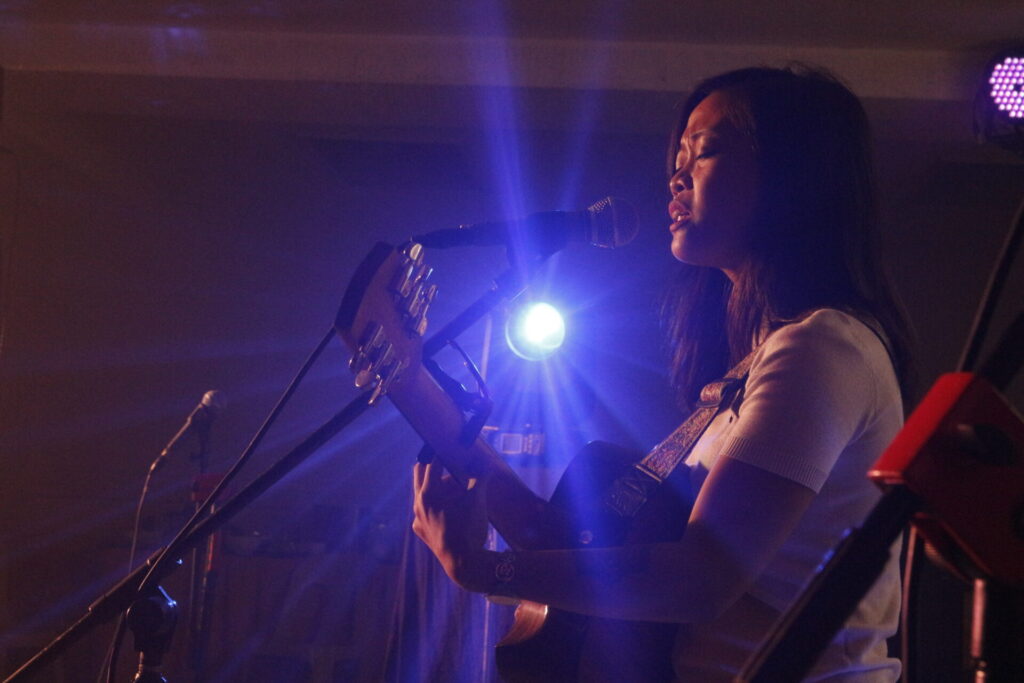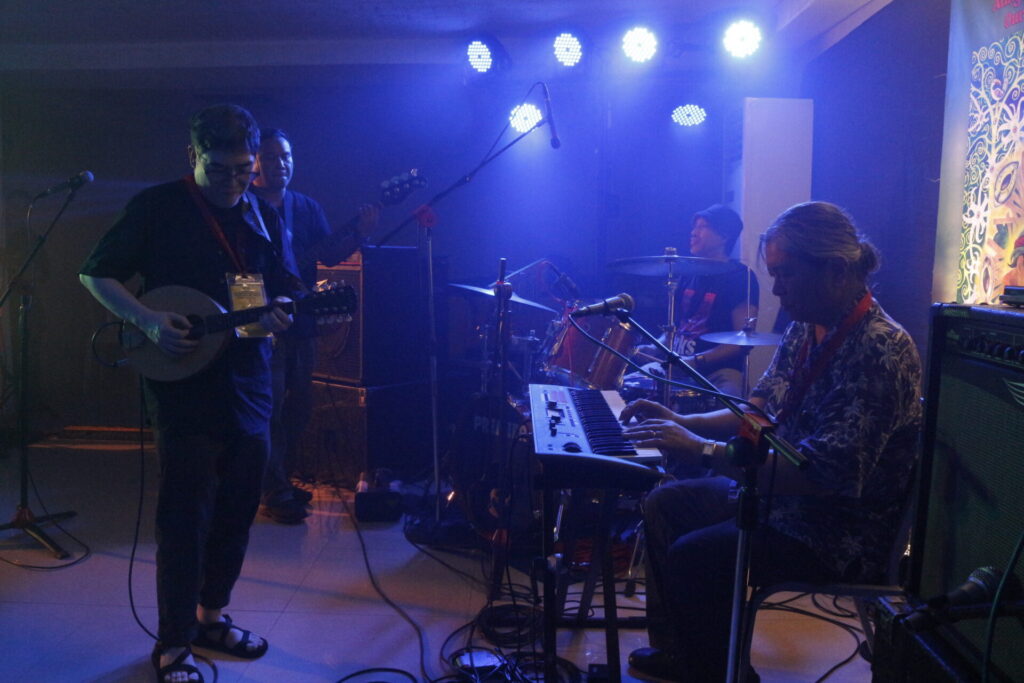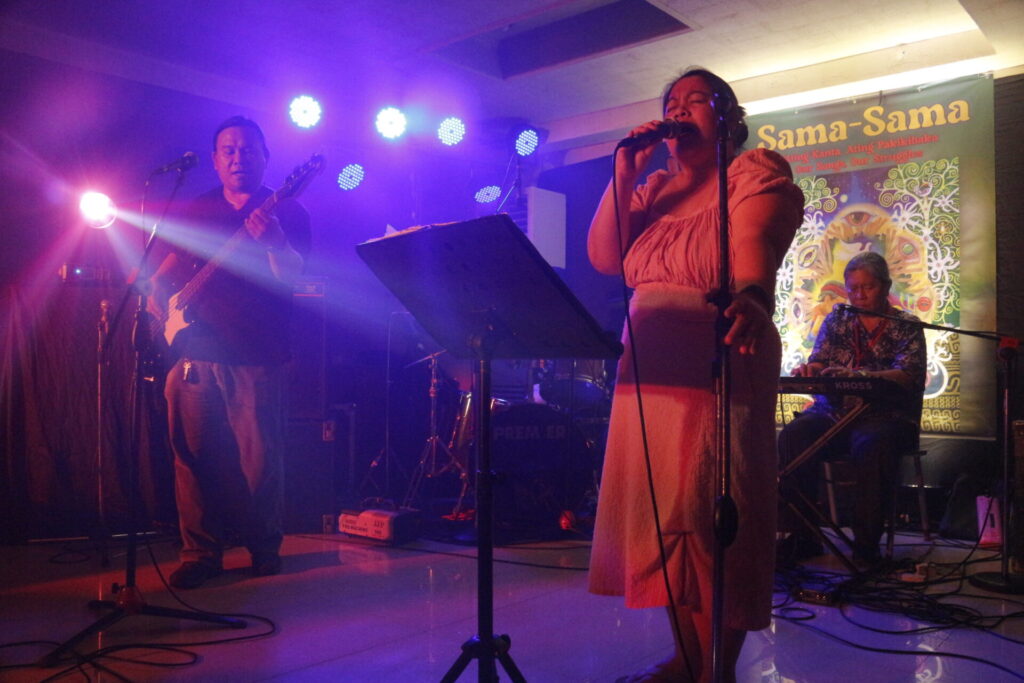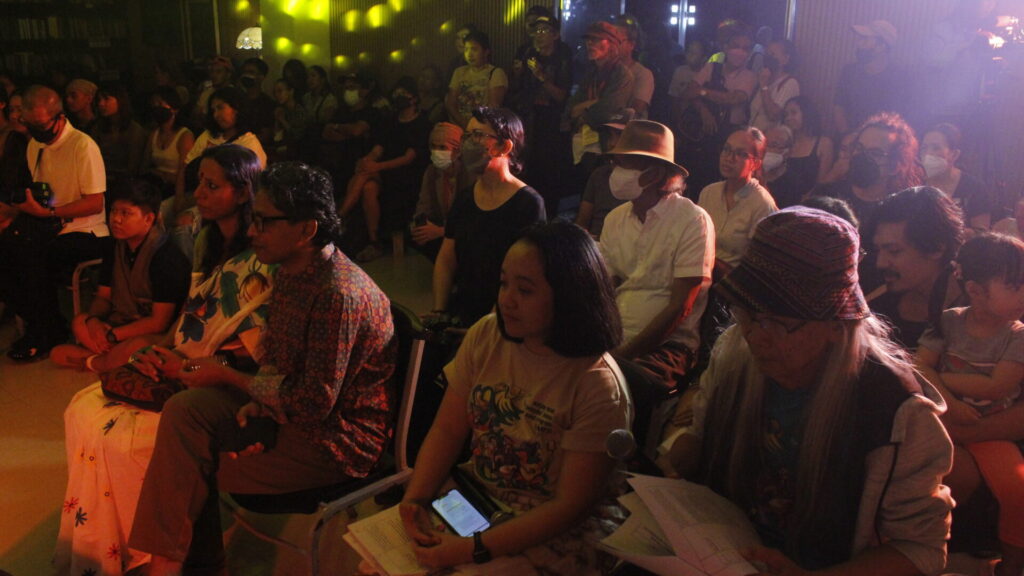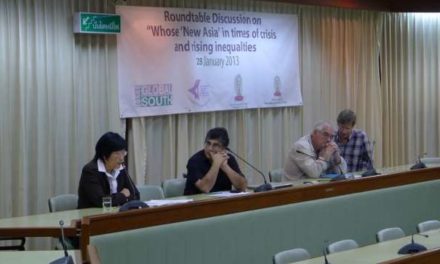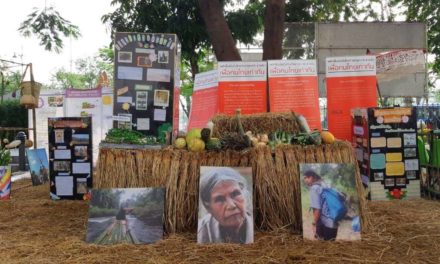Pictures provided by Asian Music for People’s Peace and Progress (AMP3)
Under the dimly lit room of a university hotel in UP Dilliman, Manila, music enthusiasts and artists from across Asia gathered to celebrate and echo the voices of struggle through music. As the ambient hum of conversations gently quieted down, the opening notes of ’Hayaang Mangusap ang Aking Gitara’ (Let My Guitar Speak), the iconic song by Jess Santiago, flowed through the speakers, setting the tone for a night of poignant melodies and powerful messages.
- Venue at University Hotel
- The event was free and open for public
- Jess Santiago and Anisa Widyasari
- Jess Santiago
As the host of the event alongside Jess Santiago, I started by sharing the history of Hayaang which was Santiago’s first composition. The song, part of Santiago’s 1991 debut album ‘Halina’, was a testament to his mission as a singer-songwriter, one that quickly resonated with the evening’s theme – “Sama-Sama: Ating Kanta, Ating Pakikibaka, Our Songs, Our Struggles”.
The crowd welcomed Jess Santiago, affectionately known as “Koyang”, with enthusiastic applause. As one of the pioneers of the people’s music movement in the Philippines, Koyang was the perfect person to introduce the Asian Music for People’s Peace and Progress (AMP3), an initiative that had organized this profound gathering of socially engaged musicians from across Asia.
Koyang’s voice echoed in the room, highlighting the purpose of the gathering – to sample songs rooted in people’s struggles. “These artists, their songs, and music represent a collective response, resistance, a push back and push forward propelled by people’s hopes and dreams,” he shared.
- PASADA
- Nithitorn Thongthirakul, Pakapol Kornkranok, and Nutchanon Pason
- Aniya Kalinaw
- Amal Akash and Bithi Ghosh
The band PASADA, a leading exponent of progressive music in the Philippines, graced the stage next. Their music, a fusion of indigenous sounds, folk and rock elements, and their songs – like ‘Sanlibutan’, ‘Bugaw’, and ‘Bagong Komunidad’ – encapsulated stories of struggle and triumph, calls for environmental justice, tributes to victims of child prostitution, and hopes for a peaceful society built on solidarity.
Next, the stage welcomed Nithitorn Thongthirakul or Ae Nitikul, Pakapol Kornkranok, and Nutchanon Pason from Thailand. Keeping alive the tradition of the Songs for Life movement born out of Thailand’s struggle for freedom in the 70s, they mesmerized the audience with songs like ‘Ploen Lam kong’ and ‘No Forest, No Water’, played with the distinct tunes of the Khene, a bamboo mouth organ native to Laos and the Isan region of Thailand.
Aniya Kalinaw, a musician, teacher, and artist from Batangas City, followed. The songstress, whose name translates to “she said peace”, enthralled the audience with songs inspired by rural life and the struggles faced by indigenous women. Her performance of ‘Likha’, ‘Usad Tayo’, and ‘Ang Pag-ibig ay hindi paglimot’ resonated deeply, echoing issues ranging from disinformation and national history to the poor handling of the COVID-19 crisis.
From the heart of Bangladesh came the riveting sounds of Samageet, a cultural initiative that speaks to the issues of their time through their music. With representatives Amal Akash and Bithi Ghosh at the helm, their performance was a bold statement on contemporary issues. They performed two songs,‘Masanobufukooka’, a testament to their relentless fight for a just society, and ’Bon Morog’, a folk-drama song that echoed the struggles of indigenous communities from an Eco-park protest held in 2004.
- Vedi Sinha and Sumant Balakrishnan
- Musikang Bayan
- Ika Yuliana
- Bong Ramilo
Then, from the heartland of India, came Vedi Sinha and Sumant Balakrishnan with ‘The Aahvaan project‘, a fusion of folk music and storytelling aimed at promoting love, humanity, and compassion. Their songs like ‘Dekh Vidhata’, ‘Maya Manka’, and ‘Dekh Tamasha’ tackled current political climates, issues of gender, caste, creed, and religion, and presented a satirical take on today’s rapidly changing world where human lives are often reduced to mere data.
The vibrant melodies of the night flowed seamlessly into the next act, Musikang Bayan. Originally an acoustic band, their objective since formation in 2002 has been to write songs that encapsulate the ordinary people’s lives and struggles. They opened with ’Mapanganib’, a poignant tune inspired by an Albert Einstein quote, emphasizing the peril of apathy in the face of injustice. Their second song painted a stirring picture of a society awakening from oppression, a call to arms promising freedom and equality for all. Finally, they rendered ‘Di Pangkaraniwan’, a tribute to the tireless warriors for justice and peace, dedicated especially to the musicians of AMP3 who create and perform songs for social change.
Ika Yuliana graced the stage next. The Indonesian cultural producer and community researcher began her set with ‘Kabut Putih’, her rendition of a song by Dialita, a group of survivors from the 1965 communist purge in Indonesia. The song, part of the album “Songs for My Children,” was a haunting echo of their resilience. She followed it with ‘Akar Wangi’, a heartfelt apology to Mother Earth, penned by her good friend, Hara. Her vocal performance was accompanied by Leonard Reyes from the Village Idiots on guitar.
From the soulful notes of Ika’s music, the concert moved on to the tunes of Bong Ramilo, a Filipino-Australian musician, and a veteran of the people’s theater movement. Now based in Darwin, Australia, Bong has spent his life working with various communities as a community-based artist. His set of three songs included ‘Pagbalik’, a heart-wrenching piece inspired by the tragic events in the Philippines and Myanmar in 2021. ‘Ilog’, a love song for his wife and the environment, and ‘May Panahon’, a classic song written in his student days at UP Diliman with his friend and comrade Rene Agbayani, mirroring the agony of witnessing the suffering of the masses and the decision to join the people’s fight for freedom.
- Mara Peralta
- Messenger Band
- Messenger Band
- Nicole Abuda
Kyaw Lin, a singer-songwriter and animator at the forefront of the Arts for Civil Disobedience Movement (Arts4CDM) in Myanmar, took the stage next. His project promotes freedom of expression under dictatorship, using art and music to uplift people’s spirits in these turbulent times. His performance of ‘Carry On’, his original song expressing solidarity with grassroots humanitarian organizations aiding people in conflict areas, was enhanced by Sumant from The Aahvan Project’s deft accompaniment on the guitar.
Following the international collaborations, Mara Peralta, a peasant advocate and cultural worker, was a commanding presence. Her set included three songs inspired by the struggle of the peasantry: ’Pulang Pulang Puso’, a tribute to one of the seven HL Massacre martyrs, Juancho Sanchez, ‘Mga Himig ng Amihan’, dedicated to peasant women, and ‘Panaghoy ng Lupa’, a lamentation depicting the horrors of fascism against peasants.
Messenger Band, formed by women workers in the Cambodian garment industry under the Women’s Agenda for Change (WAC), used their music to challenge gender stereotypes, discrimination, and violence. They performed three songs, including ‘Women Heroism’, which celebrated the struggles and heroism of women fighting against repression. Their music also included ‘Health Service’, shedding light on the implications of proposed public health service reforms and the impact of high healthcare costs. Additionally, they presented ’Say No To RCEP’, a contribution to the campaign against the Regional Comprehensive Economic Partnership agreement.
Nicole Abuda, an advocate of Filipino Pop & Folk music, graced the stage with her heartfelt compositions. Her songs, ‘Ibon’ (Bird), ‘Ulan’ (Rain), and the yet-to-be-released track ‘Gaanuman’, showcased her ability to intertwine traditional and contemporary elements in her songwriting, invoking emotions and inspiring action.
- Robi Navicula
- Chi Suwichan and Jenny Kuewa
- Dania Reyes
- Aila Bathan
Gede Robi Supriyanto, known as Robi Navicula, an Indonesian rock musician, activist, and farmer, captivated the audience with two powerful songs. ‘Metamorfosa Kata’ (The Metamorphosis of Words) emphasized the importance of articulating ideas and transforming them into meaningful action, while a cover of Jess Santiago’s song ‘Halina’, sang in Bahasa Indonesia, paid homage to the spirit of regional collaboration of AMP3.
Karen musicians and activists Chi Suwichan and Jenny Kuewa blended the unique sounds of the Tehnaku, an ethnic musical instrument, with contemporary social themes. Accompanied by Pakapol Kornkranok and Nutchanon Pason, they performed ’Kor du der’, a heartfelt call for unity and comfort, and ‘Wildlife’, a poignant clarion call to protect the forest ecosystem.
Dania Reyes, a musician and member of the Alliance of Contractual Employees in UP, presented two songs by songwriter Ali Arriesgado, namely ‘Hambog’ (Pride) and ’Aklasan’ (Strike), accompanied by Boy Dominguez on harmonica. Her performance resonated with themes of empowerment and social justice.
Aila Bathan, representing Concerned Artists of the Philippines (CAP), sang two songs by singer-songwriter Rom Dongeto. ’Bayani ng Kalikasan’ (Nature’s Hero) served as the theme song for the Gawad Bayani sa Kalikasan, recognizing environmental defenders, while ’Lea’ was an iconic love song by the group Buklod.
- Manji Ikuta
- The Village Idiots
- The Village Idiots
- The concert showcased 18 remarkable artists from 8 countries
Manji Ikuta, a renowned artist from Japan, son of an atomic bomb survivor, and committed advocate for human rights, the environment, and peace, shared his profound songs. ’Requiem for Kavita’ shed light on the tragic story of a Nepali girl who fell victim to human trafficking, ‘Morning Glory’ was a heartfelt tribute to the children in Negros, and ‘Fishermen’s Chant’ echoed the opposition to a dam project, accompanied by a Korean traditional fisherman’s rhythm.
Closing the concert was The Village Idiots, a band that emerged from the collaborative project Banda RR, performed three impactful songs. ’Nakita Kita’ honored Kerima, a young poet and revolutionary who lost her life in a military encounter in 2021. ‘Unang Araw ng Abril’ recounted the Kidapawan tragedy in 2016, the violent dispersal of farmers and indigenous peoples demanding food, resulting in casualties. They concluded their set with ‘Pagkatapos Nito’, a song symbolizing aspirations for a better society after the pandemic.
The concert proved to be a momentous occasion, uniting a total of 18 remarkable artists from 8 countries, showcasing the rich diversity of Asia’s music activism. Held on the evening of June 20, 2023, the event marked the triumphant culmination of the AMP3 Regional Assembly and Consultation titled “Songs and Social Movement: Music Activism in Asia”, which was held from June 18-20, 2023. With each powerful performance, the concert resonated with profound messages, stirring emotions, and an unwavering dedication to effecting social change.
As the curtains fell on this inspiring concert, it served as a resounding call for all of us to harness the potential of artivism. In a world grappling with complex challenges, let us take inspiration from the artists who graced the stage and use our creativity as a force for positive change. Through music, visual arts, theater, and all forms of artistic expression, let us amplify marginalized voices, challenge oppressive systems, and build bridges of understanding. Together, let us embrace the transformative power of art to shape a more inclusive, just, and harmonious world for generations to come.
*Anisa Widyasari, from Indonesia, is Content Creator and Outreach Coordinator for Focus on the Global South.

